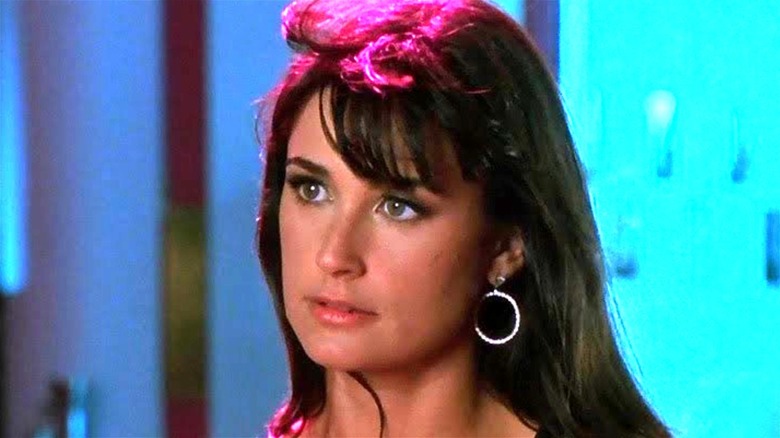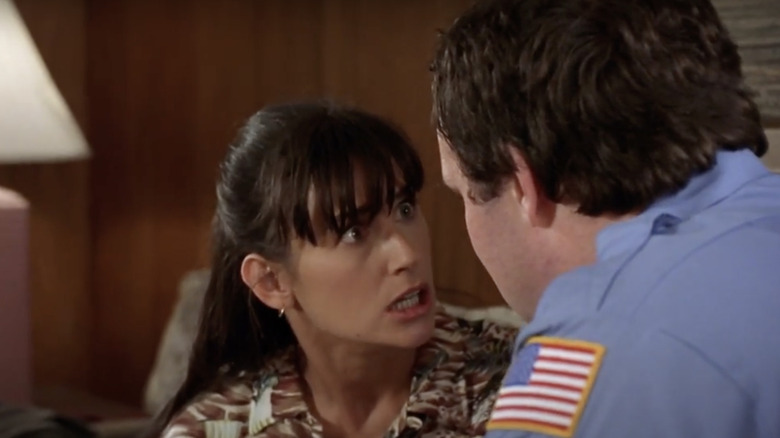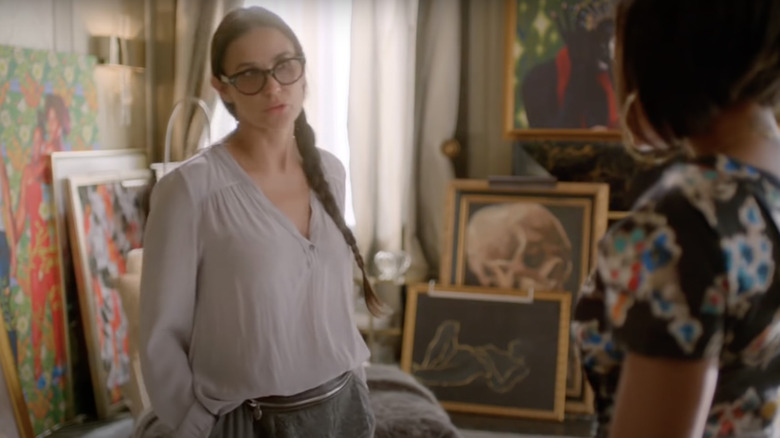How Striptease Almost Ended Demi Moore's Acting Career
An ill-equipped father gaining full custody of his daughter. A former FBI secretary turned exotic dancer. Mid-'90s Miami. Out the gate, the 1996 movie "Striptease" sounds like a bit of a mess, but in a kind of fun way. Demi Moore plays Erin Grant, who is fired from her job at the FBI thanks to her criminal ex-husband, resulting in her loss of custody of their daughter, Angela (who, interestingly enough, was played by Demi Moore's real-life daughter, Rumer Willis, whom she had with Bruce Willis). So, Erin starts dancing at the Eager Beaver strip club, where she meets some unsavory characters, including a murderous U.S. congressman (Burt Reynolds). She ultimately gets him on tape confessing his crimes, and in the process, regains her FBI job and child custody. So yeah, kind of ridiculous, but also totally fun!
Although Moore earned a record-high salary of $12.5 million for her performance in "Striptease" (via Celebrity Net Worth), the movie really damaged her career, making her already tragic life story a little more so. Up till that point, Moore seemed unstoppable. Her role as Debbie Sullivan in the 1986 romantic comedy "About Last Night..." catapulted her into stardom with generally positive reviews from critics (via Metacritic), while the 1990 movie "Ghost," in which she starred opposite Patrick Swayze and Whoopi Goldberg, had some seriously iconic moments. And it's not like 1996 was just a bad year for Moore — "Striptease" came out just one week after "The Hunchback of Notre Dame," wherein the actress voiced the role of Esmeralda, and "Hunchback" was one of the movies that comprised the Disney Renaissance of the 1990s. So what happened with "Striptease"? Keep reading to find out.
Critics thought Moore's acting in Striptease was subpar
The wacky plot of "Striptease" wasn't exactly setting up its stars for success, but film critics pretty consistently thought Demi Moore could've done better with her role. The movie earned a Metascore of 37 out of 100, with critics wishing for more comedy — and less stripping — as in this critique from SFGate's Mick LaSalle. Others, such as the late Gene Siskel for the Chicago Tribune, commented that the movie was first and foremost about Moore's ultra-fit post-pregnancy body rather than any real story.
Moore would get some formal recognition for her acting, however — just not the kind an actress wants. For her performance in "Striptease," she received the 1997 Golden Raspberry Award for Worst Actress, a big deal for a role that came with such a high salary. Unfortunately, she would take the title again the following year for her performance as Lieutenant Jordan O'Neill in "G.I. Jane" (via IMDb). As Terri Schwartz noted in 2009 for MTV, Moore's spell of bad movies would last for quite some time, with the actress regaining some footing with the 2003 movie "Charlie's Angels: Full Throttle," although by that time, her reign as the It Girl on the big screen had come to an end.
That high salary caused problems ...
Demi Moore's salary of $12.5 million for "Striptease" made her the highest-paid actress ever at the time, but with the overall negative reviews of her acting in the movie, it might have been an unfortunate time to raise her rate, as some producers would wonder what they were really paying so much for. In a 2020 interview with Variety, Moore confirmed that the record-breaking salary was a problem, saying, "My salary for 'Striptease' became something that I got punished for as opposed to celebrated."
But some thought that Moore was being unfairly criticized for her high salary. A 1995 Entertainment Weekly article quoted Martin Shafer, the then-president of Castle Rock Pictures, in support of the actress, "The reason there's so much discussion is only because she's a woman," he said. "She is every bit as valuable as the dozen guys who get comparable money. On an international basis, Demi Moore is the biggest female star in the world."
... But things have steadily improved
There was, however, a positive side to Demi Moore's high salary, besides her getting millions of dollars. Entertainment Weekly called it "a reverse domino effect," arguing that the star's salary allowed other actresses like Julia Roberts, Jodie Foster, Meg Ryan, and Sharon Stone to raise their asking prices by millions of dollars. Stone's manager even commented, "It's great ... It's forcing every woman's salary up."
With the passage of over two decades since "Striptease" came out, Moore reflected on the influence her salary had with Variety, saying, "Everything is serving the whole, and it comes back around to be able to be seen now for what that is. Because of that, we have an opportunity to redirect and change that. It's taken a bit, but that's OK." And her career seems to be rebounding, too. After her series of bad movies in the late 1990s and early 2000s, Moore went into producing and found greater success there, and she's recently landed some recurring roles on popular TV shows like "Empire." Hopefully, this means the "Striptease" curse has been lifted.



